MercoPress. South Atlantic News Agency
Fisheries
-
Monday, January 22nd 2018 - 09:21 UTC
Brazil looking to overcome the self imposed ban of fish produce to the EU
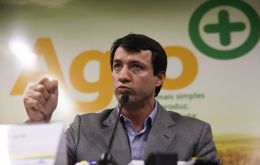
“Suspending the export of Brazilian fish to the European Union was a hard decision and still not well understood,” the interim fisheries minister Eumar Novacki said at a meeting with businessmen from the sector, at the headquarters of the Ministry of Agriculture, Livestock and Supply (MAPA).
-
Monday, January 22nd 2018 - 09:13 UTC
Good start for Argentine squid season: daily average catches of 28 to 35 tons
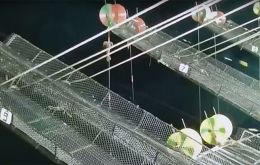
The squid fishing season in the South Atlantic, operating with Argentine licenses, has started with good prospects and a moderate optimism of the sector. During the first week jiggers reported daily average catches that oscillated between 28 and 35 tons, according to Pescare, an Argentine fish industry publication. .
-
Wednesday, January 17th 2018 - 09:12 UTC
European Parliament bans electric pulse fishing; rejection from Dutch fishermen

The European Parliament called on Tuesday for a ban on electric pulse fishing in the European Union, defying Brussels which wants the experimental practice in the North Sea done on a larger scale. The parliament, the EU's only directly elected body, will now try to strike a compromise with the European Commission, the bloc's executive, and the European Council, which groups the 28 member states.
-
Friday, January 12th 2018 - 07:18 UTC
Falklands concern with vast fishing fleet gathering on high seas

A vast fleet of fishing vessels assembling to catch Illex squid on the high seas, some 400 miles north of the Falkland Islands, is an issue of concern to the Falkland Islands Fisheries Department.
-
Friday, January 5th 2018 - 10:00 UTC
Controversy in Brazil for self imposed ban on sea food exports to Europe
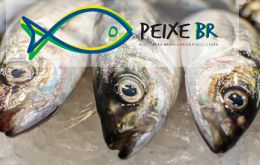
The Brazilian aquaculture association Peixe BR criticized the temporary suspension of fish and shellfish exports to the European Union (EU) self-imposed by the Brazilian government. The entity which represents more than half of the Brazilian production of farmed fish argued that “without doubt, this is bad news, but it can't be said that it is unexpected or that it has been a surprise for the Brazilian authorities”.
-
Friday, January 5th 2018 - 09:44 UTC
Galicia medium sized fish processing plants benefit with 8.3m Euros
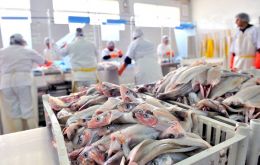
A total of 50 small and medium-sized companies in Galicia were beneficiaries of the 2017 call for investments aid that result in improvements in the processing of fishery, shellfish and aquaculture products. This was announced by the Minister of Marine Affairs, Rosa Quintana, at the Pobra do Caramiñal, during a visit to the refrigeration logistics company Alimentos Cruz del Sur (Alicrusa), one of the beneficiaries.
-
Friday, January 5th 2018 - 09:39 UTC
Scottish seafood processing industry threatened by Brexit: most workers from EEA

A study into employment patterns of non-UK workers showed that 58% of Scottish seafood processing business employees come from other countries of the European Economic Area (EEA).
-
Thursday, December 28th 2017 - 09:24 UTC
Brazil suspends fish exports to the EU over inspection discrepancies
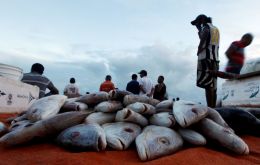
Brazil said it was suspending fish exports to the European Union in response to concerns raised by Brussels' veterinary inspectors. The move was aimed at preventing the EU itself from ordering a suspension, said Luis Rangel, the secretary of state in charge of fisheries.
-
Wednesday, December 20th 2017 - 08:48 UTC
Protecting UK (and Falklands) fisheries in a post Brexit scenario

In the midst of the Brexit debate in the UK, and its expected consequences, Environment Secretary Michael Gove has anticipated EU fishing quotas referred to UK will be scrapped and if things go as planned by the cabinet member, French, Spanish, Danish and other nations fishing fleets will be chased form illegally fishing in UK waters.
-
Monday, December 18th 2017 - 13:12 UTC
Chile bans bottom sea trawling in 98% of its EEZ to protect marine environment

Chile's Under secretariat of Fisheries and Aquaculture, SUBPESCA, and Oceana Chile jointly announced the freezing of the fishing footprint for the common hake and demersal crustacean fisheries. This means that 98% of Chile's exclusive economic zone, EEZ, will be protected from bottom trawling.
